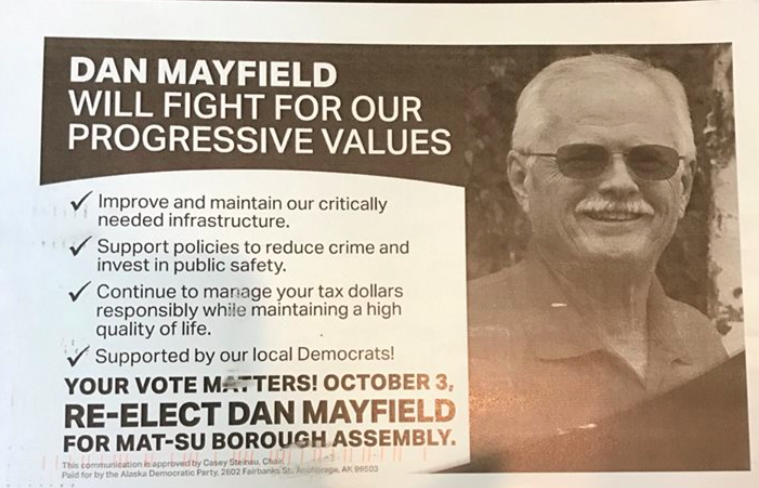Dan Mayfield was Democrat, but recently switched to nonpartisan — or as he puts it, independent — although there is no such designation in the plethora of voter registration options.
But even though he’s not officially a Democrat for the Oct. 3 municipal election, the Alaska Democratic Party is backing him all the way for re-election on the Mat-Su Borough Assembly, because he will “fight for our progressive values.”

According to the Democrats’ flyer, which was mailed to non-Republicans in the district, things like infrastructure, public safety, and responsibly managing public funds are progressive values. “Supported by our local Democrats!” the material says.
Mayfield and his family strenuously objected to various negative comments on Facebook after the flyer was posted on social media by campaign consultant Anand Dubey, who is supporting Mayfield’s opponent, Clayton “Mokie” Tew.
“I am an independent,” Mayfield wrote. “Those in the republican party know that but have chosen to state otherwise. I welcome support from republicans and democrats because local government is suppose to serve people on a non-partisian basis. We are suppose to weigh the issues of the day and make decisions that consider the wishes of our entire Borough. I do that. Considering the proven history of the other candidate, I am surprised by this negativity.”
Further south in Juneau, the Alaska Democrats are backing Democrat Rob Edwardson, who is Rep. Justin Parish’s legislative aide, in the City and Borough of Juneau Assembly race. Edwardson is running against Debbie White, the incumbent.
If Parish is a “D,” then Edwardson is a Big Government Democrat. His position on government is:
“As the State Capital, Juneau is a government town and needs to retain government jobs. I have been fortunate to be able to work on that subject during my career. These necessary government jobs fuel the economy of Juneau alongside private sector jobs. Government workers are homeowners, customers, travelers, and their children attend Juneau’s schools,” Edwardson wrote on his Facebook page.
In both cases, the Democrats call their chosen candidates “progressives,” rather than “Democrats” as the pattern of Democrats running away from their party identification continues. They know if is difficult to get elected as a Democrat, given how far left Alaska’s Democrats have drifted over the years.
The trend started with Rep. Daniel Ortiz of Ketchikan, Gov. Bill Walker, and Rep. Jason Grenn of Anchorage. All “independent” candidates who came into office with the robust support of the Alaska Democratic Party.
The political parties have long been involved in local elections, but they usually do it quietly, with get-out-the-vote efforts. The Alaska Democrats have made it clear that these days there is nothing nonpartisan about local races and they are going to spend money on mailers and social media boosts in these elections.
The Alaska Democratic Party is registered with Alaska Public Offices Commission to participate in municipal races throughout the state. It’s part of a greater strategy to put Democrats in place at the local level, and train up the best of them to run for state office.
Local assembly, school board, and mayoral races take place around Alaska on Oct. 3, with the exception of Anchorage, which holds its municipal election in April.


Three of the four “progressive values” listed look to be hijacked Republican values, but in our neck of the woods, sponsorship by the Democrat Party is problematic.
Comments are closed.